What is Portable Gas Generator
Portable gas generators are compact, mobile power solutions that offer electricity on the go. They serve as a backup power source during outages, in remote locations without access to the power grid, or for outdoor activities where electrical power is needed. These generators are fueled by various types of gases, such as natural gas, propane, or gasoline, and are designed to be easy to transport and use without the need for a stationary setup.
Intended users of portable gas generators include homeowners seeking a reliable backup power supply, outdoor enthusiasts looking for energy to support their adventures, and workers on job sites where access to electricity is limited or nonexistent. These generators are also commonly used in regions where the reliability of the power grid is low, making them a critical lifeline during emergencies or disasters.
The principle of operation for a portable gas generator is similar to that of a standard internal combustion engine. It converts the chemical energy in fuel into mechanical energy, which then drives an alternator to produce electrical power. The amount of power generated depends on the size of the generator and the type of fuel it uses. This process allows for the generation of electricity in locations where it might otherwise be unavailable or prohibitively expensive to obtain through other means.
Types of Portable Gas Generators
Portable gas generators come in an assortment of types, each tailored to suit specific applications and needs. Here are some common varieties:
-
Recoil Start Generators: These are typically small and designed for quick manual starting by pulling a cord. Ideal for small power needs or as a backup option in case of an electrical failure.
-
Electric Start Generators: Larger and more powerful than recoil-start models, electric start generators have a battery that can be charged by turning on the engine or through external power sources. They are commonly used in residential settings and at job sites where they can be easily started without the physical effort of pulling a cord.
-
Dual Fuel Generators: These versatile units can run on more than one type of fuel, offering flexibility in case one type is unavailable or too expensive. They are suitable for applications where access to different fuel sources is possible.
-
Inverter Generators: Known for their quiet operation and portability, inverter generators produce clean AC power that is safe for sensitive electronic devices. They are often used for camping, outdoor events, or in locations where noise restrictions apply.
-
Welder Generators: These specialized generators include additional features necessary for welding, such as the ability to produce constant voltage even when engine speed changes. They're used in workshops and job sites where metal work is involved.
How to choose Portable Gas Generator
Selecting the right portable gas generator involves several considerations that align with your specific business needs. Here's how you can approach this:
-
Power Output: The wattage requirement will depend on the equipment you intend to run. For example, powering a small office with a few lights and computers might only need a 2,000-watt generator. However, if you're considering a generator for more demanding tasks like running power tools at a construction site, you may need one with higher output and more robust features.
-
Fuel Type: Portable generators can run on various fuel types such as gasoline, propane, or natural gas. Gasoline is commonly available but can be less convenient due to its shorter shelf life and flammability. Propane and natural gas offer greater convenience but might incur higher operating costs.
-
Engine Type: The engine type—like 4-stroke or 2-stroke—will affect the generator's performance and maintenance needs. A 4-stroke engine is generally more efficient and produces less noise but could be heavier.
-
Output Type: The type of output (single-phase or 3-phase) will determine what kind of electrical devices you can power with the generator.
-
Portability Features: Look for features that enhance portability such as wheels or lightweight construction if you need to move the generator frequently.
-
Brand and Reviews: While brand reputation is not a guarantee of quality, it can provide some assurance. Reviews from other users can also offer insights into the generator's reliability.
Remembering these factors will help ensure that you find a portable gas generator that meets your business's demands efficiently and effectively.
About Portable Gas Generator on Alibaba.com
Alibaba.com stands out as a global marketplace connecting businesses with a vast selection of portable gas generators suitable for a wide range of commercial applications. With an extensive network of suppliers offering products from nearly 5,900 different categories, buyers can find precisely what they need—be it for emergency backup power in rural areas or continuous operation at industrial facilities.
The platform's user-friendly interface allows businesses to filter search results by specific requirements such as starting system, engine type, output type, and more—streamlining the selection process. Moreover, with features like Trade Assurance, buyers have added peace of mind knowing their transactions are secure until delivery is confirmed.
Alibaba.com's commitment to facilitating easy global trade is evident through its multilingual support system and mobile-friendly shopping experience. Whether you're looking to power a small retail shop or provide backup electricity solutions for industrial plants, Alibaba.com offers an array of options that can cater to diverse business needs while ensuring quality and reliability.
Common FAQs for Portable Gas Generator
What factors should I consider when choosing a portable gas generator for my business?
When selecting a portable gas generator for your business, consider the power output needed, the type of fuel it uses, the runtime required, additional features like electric start or wheels for mobility, and compliance with emission standards.
How can I determine the right size of a portable gas generator for my business?
Calculate the total wattage of the devices you need to power, add any extra wattage for safety and startup requirements, and select a generator that can supply that amount of power without being overkill.
What are the benefits of a dual-fuel portable gas generator?
Dual-fuel portable gas generators offer versatility by allowing you to use either gasoline or propane as fuel, which can be especially useful in emergencies or where fuel availability varies.
Can portable gas generators be used for outdoor events or in construction sites?
Yes, many portable gas generators are designed for outdoor events or construction sites and are typically robust and weather-resistant.
What is the advantage of an inverter generator over a standard generator?
Inverter generators produce AC power like standard generators but are more fuel-efficient, quieter, and provide a stable power supply that's safe for sensitive electronics.
How long can a portable gas generator run on a full tank of fuel?
The runtime of a portable gas generator varies widely depending on its fuel capacity and the size of the fuel tank. Some models can run for several hours on a single tank.
What maintenance is required for a portable gas generator?
Maintenance for a portable gas generator usually includes regular oil checks, filter inspections, and keeping the fuel tank clean. Some models may also require occasional battery maintenance.
Are there any safety concerns I should be aware of when operating a portable gas generator?
Always follow the manufacturer's guidelines for safe operation, which include using the generator outdoors or in well-ventilated areas, checking for carbon monoxide buildup, and ensuring proper grounding.
Can I connect a portable gas generator to my business's electrical system during a power outage?
Many portable gas generators come with features that allow them to be connected to your business's electrical system during a power outage. Check the specifications to ensure compatibility with your setup.
How do I maintain my portable gas generator during periods of extended use?
Regularly check for any loose bolts or connections, clean the air filter if accessible, and perform professional servicing as recommended by the manufacturer to maintain optimal performance during extended periods of use.
What should I do if my portable gas generator isn't starting?
If your portable gas generator isn't starting, first ensure that there's enough fuel in the tank, the fuel valve is open, the spark plug is clean and not fouled, and the oil level is within the specified range.
Is it possible to use a portable gas generator indoors?
Using a portable gas generator indoors is not recommended due to the risk of carbon monoxide poisoning. Generators should only be operated outdoors or in well-ventilated areas.
What does 'electric start' mean in the context of portable gas generators?
'Electric start' refers to a feature that allows the generator's engine to be started using an electric motor, which is particularly convenient if the generator will be used in an environment where manual starting might be difficult.
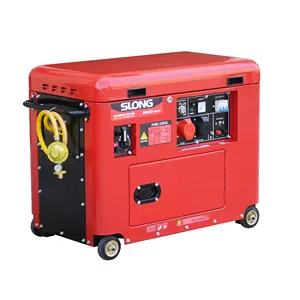








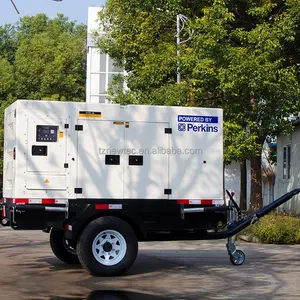

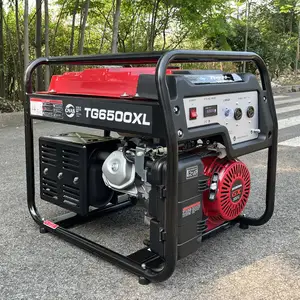


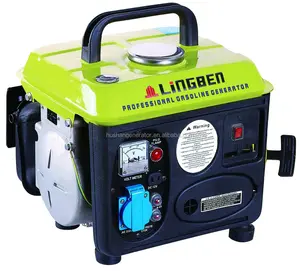


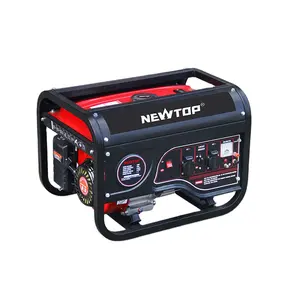
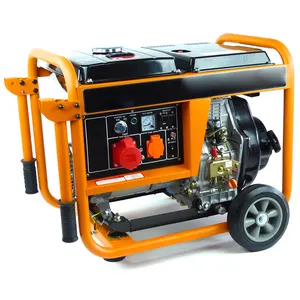

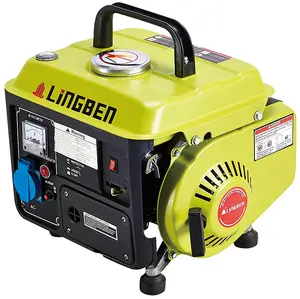
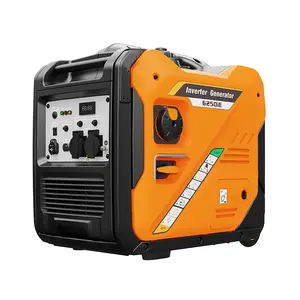






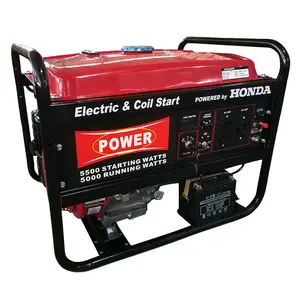
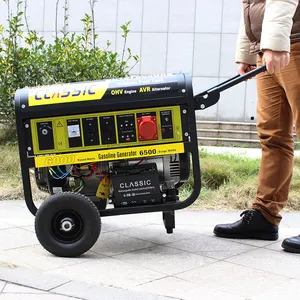


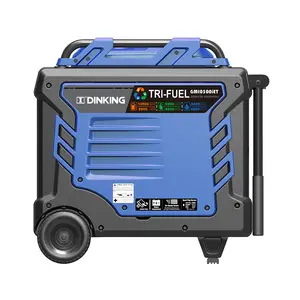




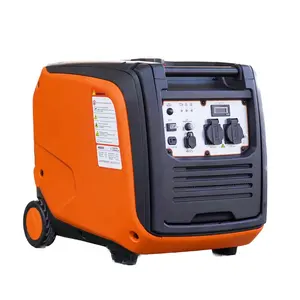










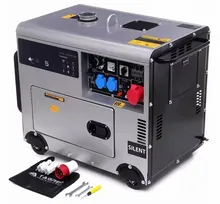
























 浙公网安备 33010002000092号
浙公网安备 33010002000092号 浙B2-20120091-4
浙B2-20120091-4